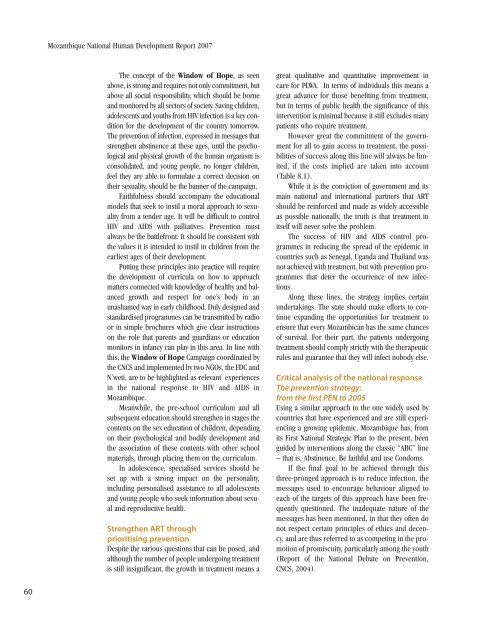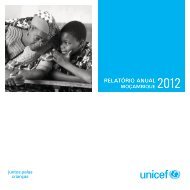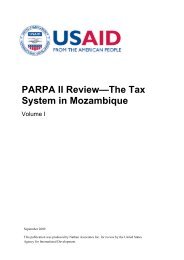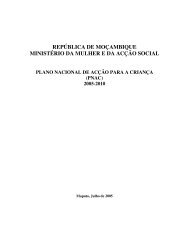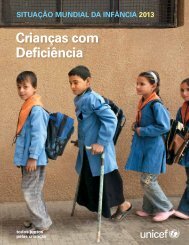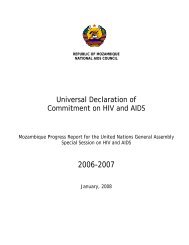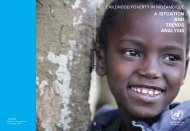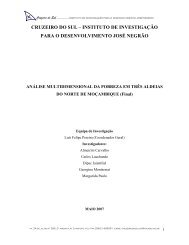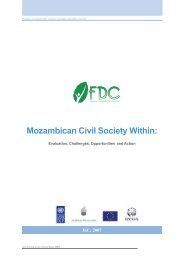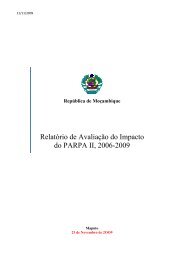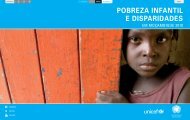English language version - Human Development Reports - United ...
English language version - Human Development Reports - United ...
English language version - Human Development Reports - United ...
- No tags were found...
Create successful ePaper yourself
Turn your PDF publications into a flip-book with our unique Google optimized e-Paper software.
Mozambique National <strong>Human</strong> <strong>Development</strong> Report 2007The concept of the Window of Hope, as seenabove, is strong and requires not only commitment, butabove all social responsibility, which should be borneand monitored by all sectors of society. Saving children,adolescents and youths from HIV infection is a key conditionfor the development of the country tomorrow.The prevention of infection, expressed in messages thatstrengthen abstinence at these ages, until the psychologicaland physical growth of the human organism isconsolidated, and young people, no longer children,feel they are able to formulate a correct decision ontheir sexuality, should be the banner of the campaign.Faithfulness should accompany the educationalmodels that seek to instil a moral approach to sexualityfrom a tender age. It will be difficult to controlHIV and AIDS with palliatives. Prevention mustalways be the battlefront. It should be consistent withthe values it is intended to instil in children from theearliest ages of their development.Putting these principles into practice will requirethe development of curricula on how to approachmatters connected with knowledge of healthy and balancedgrowth and respect for one’s body in anunashamed way in early childhood. Duly designed andstandardised programmes can be transmitted by radioor in simple brochures which give clear instructionson the role that parents and guardians or educationmonitors in infancy can play in this area. In line withthis, the Window of Hope Campaign coordinated bythe CNCS and implemented by two NGOs, the FDC andN´weti, are to be highlighted as relevant experiencesin the national response to HIV and AIDS inMozambique.Meanwhile, the pre-school curriculum and allsubsequent education should strengthen in stages thecontents on the sex education of children, dependingon their psychological and bodily development andthe association of these contents with other schoolmaterials, through placing them on the curriculum.In adolescence, specialised services should beset up with a strong impact on the personality,including personalised assistance to all adolescentsand young people who seek information about sexualand reproductive health.Strengthen ART throughprioritising preventionDespite the various questions that can be posed, andalthough the number of people undergoing treatmentis still insignificant, the growth in treatment means agreat qualitative and quantitative improvement incare for PLWA. In terms of individuals this means agreat advance for those benefiting from treatment,but in terms of public health the significance of thisintervention is minimal because it still excludes manypatients who require treatment.However great the commitment of the governmentfor all to gain access to treatment, the possibilitiesof success along this line will always be limited,if the costs implied are taken into account(Table 8.1).While it is the conviction of government and itsmain national and international partners that ARTshould be reinforced and made as widely accessibleas possible nationally, the truth is that treatment initself will never solve the problem.The success of HIV and AIDS control programmesin reducing the spread of the epidemic incountries such as Senegal, Uganda and Thailand wasnot achieved with treatment, but with prevention programmesthat deter the occurrence of new infections.Along these lines, the strategy implies certainundertakings. The state should make efforts to continueexpanding the opportunities for treatment toensure that every Mozambican has the same chancesof survival. For their part, the patients undergoingtreatment should comply strictly with the therapeuticrules and guarantee that they will infect nobody else.Critical analysis of the national responseThe prevention strategy:from the first PEN to 2005Using a similar approach to the one widely used bycountries that have experienced and are still experiencinga growing epidemic, Mozambique has, fromits First National Strategic Plan to the present, beenguided by interventions along the classic “ABC” line– that is, Abstinence, Be faithful and use Condoms.If the final goal to be achieved through thisthree-pronged approach is to reduce infection, themessages used to encourage behaviour aligned toeach of the targets of this approach have been frequentlyquestioned. The inadequate nature of themessages has been mentioned, in that they often donot respect certain principles of ethics and decency,and are thus referred to as competing in the promotionof promiscuity, particularly among the youth(Report of the National Debate on Prevention,CNCS, 2004).60


